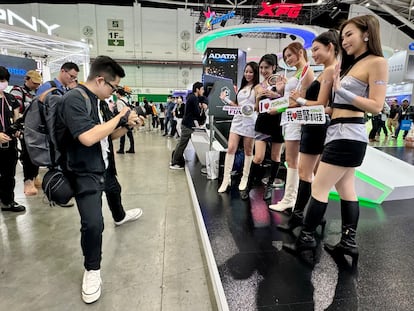Why scantily clad ‘booth babes’ are still a draw at tech fairs like Computex
Gender experts criticize how some brands continue to use female models to attract the attention of men, even though trade shows such as CES, held annually in Las Vegas, have adjusted their dress code over the years

A group of men took photos of Weihsin while she smiled and made hearts with her hands. The 25-year-old was wearing a top, a miniskirt, high-heeled boots and a headband with blue ears. On her chest there was a sticker that read DeepCool. It is the name of the company she was promoting at this year’s Computex, Asia’s largest technology fair, held between June 4 and 7. While it is no longer common to see so-called “booth babes” at large technology fairs such as CES or MWC, at this event held in the capital of Taiwan, Taipei, several companies were still using them to attract the attention of the men in attendance. It is a practice that is not exempt from criticism.
To some young men waiting to take a photo of Weishin, it seemed like a good strategy to resort to booth babes. “They should do it more often,” said one of them. Another one added: “You are definitely going to buy more products where there is a young woman than an older man.” They are 24 and 25-year-old Taiwanese students interested in technology and they don’t see anything wrong with it. “Brands could use handsome men too,” said one of them, who declined to give his name to “preserve my privacy.”
But the reality is that at this fair, companies were not using sexy, scantily clad men to promote their products. “We’re not seeing guys in a leather top. It would seem just as ridiculous to me,” says Carmen Ruiz Repullo, a professor of sociology at the University of Granada in Spain. This gender expert believes that booth babes should be banned because it is an “exploitation of women’s bodies: They are not dressing them as hostesses to work in technology fairs because they are great technologists, they are putting them there to please, and because they have an increasingly infantilized look, which is what the male gaze wants to see.”
Weishin had to stand on an elevated platform at DeepCool’s booth from nine in the morning to five in the afternoon. “They take photos with me and I dance twice a day,” says this cheerleader for a team from Taiwan, who earns between 4,000 and 6,000 Taiwanese dollars a day — between $123 and $185. She doesn’t mind taking photos with the attendees. But when they get too close, she feels uncomfortable: “Sometimes they want to take photos with me making a heart by putting our hands together or high-fiving them. I don’t like that, I prefer not to be touched.”
Like her, many other girls posed at Computex, the fair to which EL PAÍS was invited by the Council for the Development of Foreign Trade of Taiwan (TAITRA). They were at stands of tech companies such as ASRock, Montech, FSP, Persona, Innio3D or Biwin. Kiki and Rainie, two 27-year-old Taiwanese models, were hired by the latter company. “We greet, welcome and invite people to enter the stand, even though we don’t know much about the company,” they acknowledged.
“Some men write to me on Instagram”
There were also models like Tatiana Kovalchuk who are from other countries. This 26-year-old Ukrainian woman has been living in Taiwan for four months. “I found a job ad on Facebook and signed up,” she says. There are men who ask for her Instagram account and even send her messages: “They tell me that they liked meeting me and that they want to be my friends. I don’t answer them.” Those who write to her “are not young,” she notes. “Here I am exotic and white. They are fetishists.”
Among the older men taking photos of these young women was Allen Randolph Tsui. This 55-year-old amateur photographer from Taipei said he pays more attention to products when young women are showing them off. He doesn’t speak English, so he opened a translator on his phone and drew Chinese characters on the screen. “I think this is not harmful for the girls,” he said. Standing a few meters away from him was Anita Chung, a 50-year-old woman from Taipei, who does not believe it is necessary to “dress scantily or show a lot of skin to attract attention.”

Professor Repullo wonders: “Is this type of conference hostess needed at a technology fair like this?” She is convinced that the answer is no. Some companies like Cooler Master refuse to hire scantily clad girls to attract attention. “That is not the right approach. We are not here to sell physiques, we are here to sell products,” says Carlos Villanueva, head of global marketing for this company.
Among the companies that do hire these women is Montech. Chris Chen, one of the workers at this company, does not believe that it is objectifying women. He compares the situation to “a show”: “It’s like when a singer dresses sexy on stage. It doesn’t mean something sexual is taking place, it’s just the appearance. I don’t think it’s bad if you don’t look at it negatively.” A spokesperson at DeepCool claimed to respect other views: “We simply do our job. If someone doesn’t like it, they can say so and move on.”
A CEO signing a woman's chest
When she sees photographs of these girls at Computex, Ruiz thinks about “pornosocialization, a phenomenon that is occurring in this neoliberal capitalism that wants to convey to girls that they have a little more capital than boys, which has to do with their sexual capital.” This expert is alluding to “the idea of ‘exploit your erotic capital and be your own company with the body that you have’.” This “false empowerment” places the woman in a single place: “That of brightening the male gaze and male desire.”
“Hence, the erotic game that the CEO of Nvidia has played by signing on the chest of one of the girls in front of all the photographers, as if to say: ‘Well, I’m going to take the risk because I know that this will draw headlines, right?’” She is talking about Jensen Huang, an executive who is causing a stir at Computex and who recently signed his name on a woman’s chest in a booth full of people. “Is this a good idea?” he asked himself before doing it.
Move aside Tim Cook, there's a new $100bn tech bro in town! How rockstar CEO of Nvidia sparked 'Jensanity' in Taiwan and signed a fan's chest when £3tn firm past Apple after he 'accidentally' invented chips powering AI revolution while eating at Denny's https://t.co/ZXIVJoGfl6 pic.twitter.com/7PfSJVR6wg
— Daily Mail Online (@MailOnline) June 6, 2024
It seems to Repullo that all this turns women into merchandise: “It makes us believe that our value has to do with the body, the physical and the sexual.” Some defenders of booth babes indicate that women freely choose this role. This idea is used to delegitimize critical opinions, says Ana Dolores Verdú Delgado, a university professor and researcher in the field of social sciences, who insists: “Freedom is very relative at an age when you don’t have enough experience to know how to choose, and in a precarious world in which we must make many sacrifices to survive. Some women also participate in their own objectification, but I don’t see that as an act of freedom, but rather of inertia.”
There are fewer and fewer 'booth babes'
The situation has changed in recent decades. Trade shows such as CES, held annually in Las Vegas, have adjusted their dress code over the years. Currently, participants at the world’s largest consumer electronics show “must not be dressed in clothing that is sexually revealing or may be interpreted as undergarments, gender notwithstanding. Clothing that reveals an excess of bare skin, specifically genitals, chest or buttocks, must not be worn. Body-conforming clothing that hugs genitals must not be worn.”
Little by little, some booth babes have been disappearing. “At fairs like the IFA or the MWC you can see pretty hostesses, but they are not dressed like that,” says Christian Sanz, CEO of the Toro Tocho Reviews channel, who indicates that the fair that has the most, without a doubt, is Computex. This newspaper contacted TAITRA, the organizing entity of this event, to find out their position and to ask whether they have ever considered banning booth babes. The organization declined to comment on the matter.
At Computex there are also fewer models than before, and they are “less insistent,” according to Sanz. He remembers earlier times when they were in “all the stands” and they would approach him to tell him “in a romantic tone” to come see them. “I was hesitant, but you could see the Taiwanese public touching them and grabbing them by the waist.”
Luis Rosales, known as Dr. Hoodman on YouTube, has been to multiple events in Asia, where he says that things are “more traditional.” To explain, he mentions a business trip he made years ago to Taichung, a city in Taiwan, in which he was taken to a karaoke: “I was sitting down, they played music, and suddenly a woman sat next to me. She brought me a beer, started serving me and then she helped herself. I had never seen her before, and for her to be so friendly seemed very strange. So I asked a girl from the company, and she told me that she was a service lady who came to cheer you up and flirt with you.”
Is using young women to attract men really a strategy that makes brands profitable, or can it be counterproductive? Verdú, who is an expert in gender studies, believes that it is not effective because it makes many people may feel uncomfortable. For Ruiz, it is something that “depends on the male audience and where we place society.” “If this had happened in Spain in 2016 or 2017, after the #MeToo movement or the La Manada [gang rape] case, it would surely have been rejected because the context allowed it. But now we are in a context of patriarchal reaction against feminism and equality policies, where the neoliberal system has a great interest in making women buy this story of their erotic capital. It worries me.”
Sign up for our weekly newsletter to get more English-language news coverage from EL PAÍS USA Edition
Tu suscripción se está usando en otro dispositivo
¿Quieres añadir otro usuario a tu suscripción?
Si continúas leyendo en este dispositivo, no se podrá leer en el otro.
FlechaTu suscripción se está usando en otro dispositivo y solo puedes acceder a EL PAÍS desde un dispositivo a la vez.
Si quieres compartir tu cuenta, cambia tu suscripción a la modalidad Premium, así podrás añadir otro usuario. Cada uno accederá con su propia cuenta de email, lo que os permitirá personalizar vuestra experiencia en EL PAÍS.
¿Tienes una suscripción de empresa? Accede aquí para contratar más cuentas.
En el caso de no saber quién está usando tu cuenta, te recomendamos cambiar tu contraseña aquí.
Si decides continuar compartiendo tu cuenta, este mensaje se mostrará en tu dispositivo y en el de la otra persona que está usando tu cuenta de forma indefinida, afectando a tu experiencia de lectura. Puedes consultar aquí los términos y condiciones de la suscripción digital.









































